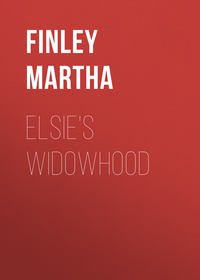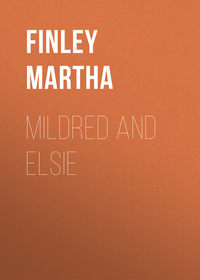 полная версия
полная версияElsie in the South
There was still more – a great deal more fruit upon that wonderful tree; various games, books, and toys for the children of the family and the servants; suitable gifts for the parents of the latter, useful and handsome articles for Christine and Alma, and small remembrances for different members of the family from relatives and friends.
Chester joined them before the distribution was quite over and was highly pleased with his share, especially the handkerchiefs embroidered by the deft fingers of his betrothed.
The captain too seemed greatly pleased with his as well as with various other gifts from his wife, children, and friends.
The distribution over, Violet's brothers hastened to Ion to go through a similar scene there. And much the same thing was in progress at the home of each of the other families of the connection.
Grandma Elsie's gift to each daughter, including Zoe, was similar to that given to Violet, tablecloth and napkins of the finest damask, embroidered by her own hands with the initials of the recipient – a most acceptable present to each.
Ned had received a number of very gratifying presents and considered himself as having fared well; but Christmas morning brought him a glad surprise. When breakfast and family worship were over his father called him to the outer door and pointing to a handsome pony grazing near at hand, said in his pleasant tones, "There is a Christmas gift from Captain Raymond to his youngest son. What do you think of it, my boy?"
"Oh, papa," cried the little fellow, clapping his hands joyously, "thank you, thank you! It's just the very best present you could have thought of for me! He's a little beauty and I'll be just as good to him as I know how to be."
"I hope so indeed," said his father; "and if you wish you may ride him over to Ion this morning."
"Oh, yes, papa! but mayn't I ride him about here a while just now, so as to be sure I'll know how to manage him on the road?"
"Why, yes; I think that's a good idea; but first put on your overcoat and cap. The air is too cool for a ride without them."
"Oh, mamma and sisters!" cried Ned, turning about to find them standing near as most interested spectators, "haven't I got just the finest of all the Christmas gifts from papa?"
"The very best for you, I think, sonny boy," returned his mother, giving him a hug and a kiss.
"And we are all very glad for you," said Grace.
"I as well as the rest, dear Ned," added Elsie, her eyes shining with pleasure.
"And we expect you to prove yourself a brave and gallant horseman, very kind and affectionate to your small steed," added Lucilla, looking with loving appreciation into the glad young face.
"Yes, indeed, I do mean to be ever so good to him," rejoined the little lad, rushing to the hat-stand and, with his mother's help, hastily assuming his overcoat and cap. "I'm all ready, papa," he shouted the next moment, racing out to the veranda where the captain was giving directions to a servant.
"Yes, my son, and so shall I be when I have slipped on my coat and cap," returned his father, taking them, with a smile of approval, from Lucilla, who had just brought them.
The next half hour passed very delightfully to little Ned, learning under his father's instruction to manage skilfully his small steed. Having had some lessons before in the riding and management of a pony, he succeeded so well that, to his extreme satisfaction, he was allowed to ride it to Ion and exhibit it there, where its beauty and his horsemanship were commented upon and admired to his heart's content.
The entire connection was invited to take Christmas dinner at Ion, and when they gathered about the table not one was missing. Everybody seemed in excellent spirits and all were well excepting Chester, who had a troublesome cough.
"I don't quite like that cough, Chester," said Dr. Conly at length, "and if you ask me for a prescription it will be a trip to Florida."
"Thank you, Cousin Art," returned Chester with a smile. "That would be a most agreeable medicine if I could spare the time and take with me the present company, or even a part of it."
"Meaning Lu, I presume, Ches," laughed Zoe.
"Among the rest; she is one of the present company," he returned pleasantly.
"What do you say, captain, to taking your family down there for a few weeks?" asked Dr. Conly, adding, "I don't think it would be a bad thing for Grace."
"I should have no objection if any of my family need it, or if they all wish to go," said the captain, looking at his wife and older daughters as he spoke.
"A visit to Florida would be something new and very pleasant, I think," said Violet.
"As I do, papa," said Grace. "Thank you for recommending it for me, Cousin Arthur," she added, giving him a pleased smile.
"Being very healthy I do not believe I need it, but I should greatly enjoy going with those who do," said Lucilla, adding in an aside to Chester, who sat next her, "I do hope you can go and get rid of that trying cough."
"Perhaps after a while; not just yet," was his low-toned reply. "I hardly know what I should like better."
"Well, don't let business hinder; your life and health are of far more importance than that, or anything else."
His only answer to that was a smile which spoke appreciation of her solicitude for him.
No more was said on the subject just then, but it was talked over later in the evening and quite a number of those present seemed taken with a desire to spend a part of the winter in Florida. Chester admitted that by the last of January he could probably go without sacrificing the interests of his clients, and the captain remarked that by that time Max would be at home and could go with them.
Grandma Elsie, her father and his wife, also Cousin Ronald and his Annis, pledged themselves to be of the party, and so many of the younger people hoped they might be able to join that it bade fair to be a large one.
"Are we going in our yacht, papa?" asked Ned Raymond.
"Some of us, perhaps, but it is unfortunately not large enough to hold us all comfortably," was the amused reply.
"Not by any means," said Dr. Conly, "but the journey can be taken more quickly by rail, and probably more safely at this time of the year."
Their plans were not matured before separating for the night, but it seemed altogether probable that quite a large company from that connection would visit Florida before the winter was over; and at the Woodburn breakfast the next morning the captain, in reply to some questions in regard to the history of that State, suggested that they, the family, should take up that study as a preparation for their expected visit there.
"I will procure the needed books," he said, "and distribute them among you older ones to be read at convenient times during the day and reported upon when we are all together in the evenings."
"An excellent idea, my dear," said Violet. "I think we will all enjoy it, for I know that Florida's history is an interesting one."
"Were you ever there, papa?" asked Elsie.
"Yes; and I found it a lovely place to visit at the right time of the year."
"That means the winter time, I suppose?"
"Yes; we should find it unpleasantly warm in the summer."
"How soon are we going, papa?" asked Ned.
"Probably about the 1st of February."
"To stay long?"
"That will depend largely upon how we enjoy ourselves."
"The study of the history of Florida will be very interesting, I am sure, father," said Lucilla; "but we will hardly find time for it until next week."
"No," he replied, "I suppose not until after New Year's – as we are to go through quite a round of family reunions. But in the meantime I will, as I said, procure the needed books."
"And shall we learn lessons in them in school time, papa?" asked Ned.
"No, son; when we are alone together in the evenings – or have with us only those who care to have a share in learning all they can about Florida. Our readers may then take turns in telling the interesting facts they have learned from the books. Do you all like the plan?"
All thought they should like it; so it was decided to carry it out.
That week except Sunday was filled with a round of most enjoyable family festivities, now at the home of one part of the connection, now at another, and wound up with a New Year's dinner at Woodburn. There was a good deal of talk among them about Florida and the pleasure probably to be found in visiting it that winter, to say nothing of the benefit to the health of several of their company – Chester especially, as he still had a troublesome cough.
"You should go by all means, Chester," said Dr. Conly, "and the sooner the better."
"I think I can arrange to go by the 1st of February," replied Chester, "and shall be glad to do so if I can secure the good company of the rest of you, or even some of you."
"Of one in particular, I presume," laughed his brother.
"Will you take us in the yacht, my dear?" asked Violet, addressing her husband.
"If the weather proves suitable we can go in that way – as many as the Dolphin can accommodate comfortably. Though probably some of the company would prefer travelling by rail, as the speedier and, at this season, the safer mode," replied Captain Raymond.
"If we take the yacht you, mamma, will go with us in it, of course," observed Violet. "Grandpa and Grandma, too."
"Thank you, daughter, the yacht always seems very pleasant and homelike to me, and I have great confidence in my honored son-in-law as her commander," returned Mrs. Travilla, with a smiling look at the captain.
He bowed his acknowledgments, saying, "Thank you, mother, I fully appreciate the kindness of that remark." Then turning to his wife's grandfather, "And you, sir, and your good wife, I hope may feel willing to be of our company should we decide to take the yacht?"
"Thank you, captain; I think it probable we will," Mr. Dinsmore said in reply.
"I wish my three brothers may be able to accompany us also," said Violet.
Neither one of them felt certain of his ability to do so, but all thought it would be a pleasure indeed to visit Florida in such company. No one seemed ready yet for definite arrangements, but as the trip was not to be taken for a month prompt decision was not esteemed necessary, and shortly after tea most of them bade good-night and left for their homes.
Chester was one of the last to go, but it was not yet very late when Lucilla and Grace sought their own little sitting-room and lingered there for a bit of chat together.
Their father had said they need not hasten with their preparations for bed, as he was coming in presently for a few moments. They had hardly finished their talk when he came in.
"Well, daughters," he said, taking a seat between them on the sofa and putting an arm about the waist of each, "I hope you have enjoyed this first day of a new year?"
"Yes, indeed, papa," both replied. "And we hope you have also," added Grace.
"I have," he said. "I think we may well be called a happy and favored family. But I wonder," he added with a smiling glance from one to the other, "if my older daughters have not been a trifle disappointed that their father has made them no New Year's gift of any account."
"Why, papa!" they both exclaimed, "you gave us such elegant and costly Christmas gifts and each several valuable books to-day. We should be very ungrateful if we did not think that quite enough."
"I am well satisfied that you should think it enough," he returned laughingly, "but I do not. Here is something more." As he spoke he took from his pocket two sealed envelopes and put one into the hand of each.
They took them with a pleased, "Oh, thank you, papa!" and hastened to open them and examine the contents.
"What is it, papa?" asked Grace with a slightly puzzled look at a folded paper found in hers.
"A certificate of stock which will increase your allowance of pocket money to about ten dollars a week."
"Oh, how nice! how kind and generous you are, papa!" she exclaimed, putting an arm about his neck and showering kisses on his lips and cheek.
"And mine is just the same, is it not, papa?" asked Lucilla, taking her turn in bestowing upon him the same sort of thanks. "But oh, I am afraid you are giving us more than you can well spare!"
"No, daughter dear," he said, "you need trouble yourselves with no fears on that score. Our kind heavenly Father has so prospered me that I can well afford it; and I have confidence in my dear girls that they will not waste it, but will use it wisely and well."
"I hope so, papa," said Grace. "You have taught us that our money is a talent for which we will have to give an account."
"Yes, daughter, I hope you will always keep that in mind, and be neither selfish nor wasteful in the use you put it to."
"I do not mean to be either, papa," she returned; "and I may always consult you about it, may I not?"
"Whenever it pleases you to do so I shall be happy to listen and advise you to the best of my ability," he answered with an affectionate look and smile.
CHAPTER III
A few days later a package of books was received at Woodburn which, upon being opened, proved to be histories of Florida ordered by the captain from the neighboring city. They were hailed with delight by Violet and the older girls, who were cordially invited to help themselves, study up the subject in private, and report progress in the evenings. Each one of them selected a book, as did the captain also.
"Aren't Elsie and I to help read them, papa?" asked Ned, in a slightly disappointed tone.
"You may both do so if you choose," their father replied, "but I hardly think the books will prove juvenile enough to interest you as much as it will to hear from us older ones some account of their contents."
"Oh, yes, papa! and your way is always best," exclaimed Elsie, her eyes beaming with pleasure. "Neddie," turning to her brother, "you know we always like listening to stories somebody tells us; even better than reading them for ourselves."
"Yes, indeed!" he cried, "I like it a great deal better. I guess papa's way is best after all."
Just then Chester came in and, when the usual greetings had been exchanged, glancing at the books, he exclaimed, "Ah, so they have come – your ordered works on Florida, captain?"
"Yes; will you help yourself to one or more and join us in the gathering up of information in regard to the history, climate, productions, et cetera, of that part of our country?"
"Thank you, captain, I will be very glad to do so," was the prompt and pleased reply. "Glad to join in your studies now and your visits to the localities afterward."
"That last, I am thinking, will be the pleasantest part," said Grace; "but all the more enjoyable for doing this part well first."
"Father," said Lucilla, "as you have visited Florida and know a great deal about its history, can't you begin our work of preparation for the trip by telling us something of the facts as we sit together in the library just after tea to-night?"
"I can if it is desired by all of you," was the pleasant-toned reply.
"Before Neddie and I have to go to bed, papa, please," exclaimed little Elsie coaxingly.
"Yes, daughter, you and Neddie shall be of the audience," replied her father, patting affectionately the little hand she had laid upon his knee. "My lecture will not be a very lengthy one, and if not quite over by your usual bedtime, you and Ned, if not too sleepy to be interested listeners, may stay up until its conclusion."
"Oh, thank you, sir!" exclaimed the little girl joyfully.
"Thank you, papa," said her brother. "I'll not grow sleepy while you are telling the story, unless you make it very dull and stupid."
"Why, son, have I ever done that?" asked his father, looking much amused, and Elsie exclaimed, "Why, Ned! papa's stories are always ever so nice and interesting."
"Most always," returned the little fellow, hanging his head and blushing with mortification; "but I have got sleepy sometimes because I couldn't help it."
"For which papa doesn't blame his little boy in the least," said the captain soothingly, drawing the little fellow to him and stroking his hair with caressing hand.
At that moment wheels were heard on the drive and Grace, glancing from the window, exclaimed joyfully, "Oh, here comes the Ion carriage with Grandma Elsie and Evelyn in it. Now, papa, you will have quite an audience."
"If they happen to want the same thing that the rest of you do," returned her father, as he left the room to welcome the visitors and help them to alight.
They had come only for a call, but it was not very difficult to persuade them to stay and spend the night, sending back word to their homes by the coachman. In prospect of their intended visit to Florida they were as greatly interested as the others in learning all they could of its history and what would be the best points to visit in search of pleasure and profit.
On leaving the tea table all gathered in the library, the ladies with their fancy needlework, Chester seated near his betrothed, the captain in an easy-chair with the little ones close beside him – one at each knee and both looking eagerly expectant; for they knew their father to be a good story-teller and thought the subject in hand one sure to prove very interesting.
After a moment's silence in which the captain seemed to be absorbed in quiet thought, he began:
"In the year 1512 – that is nearly four hundred years ago – a Spaniard named Juan Ponce De Leon, who had amassed a fortune by subjugating the natives of the island of Puerto Rico, but had grown old and wanted to be young again, having heard of an Indian tradition that there was a land to the north where was a fountain, bathing in which, and drinking of the water freely, would restore youth and make one live forever – set sail in search of it. On the 21st day of April he landed upon the eastern shore of Florida, near the mouth of the St. Johns River.
"The day was what the Romanists called Paschal Sunday, or the Sunday of the Feast of Flowers, and the land was very beautiful – with magnificent trees of various kinds, stalwart live-oaks, tall palm trees, the mournful cypress, and the brilliant dogwood. Waving moss drooped from the hanging boughs of the forest trees; golden fruit and lovely blossoms adorned those of the orange trees; while singing birds filled the air of the woods with music, and white-winged waterfowls skimmed quietly on the surface of the water. The ground was carpeted with green grass and beautiful flowers of various hues; also in the forest was an abundance of wild game, deer, turkeys, and so forth.
"De Leon thought he had found the paradise of which he was in search. He went up the river, but by mistake took a chain of lakes, supposing them to be a part of the main river, and finally reached a great sulphur and mineral spring which is now called by his name. He did not stay long, but soon sailed southward to the end of the peninsula, then back to Puerto Rico. Nine years afterward he tried to plant a colony in Florida, but the Indians resisted and mortally wounded him. He retreated to Cuba and soon afterward died there."
The captain paused in his narrative and Elsie asked, "Then did the Spaniards let the Indians have their own country in peace, papa?"
"No," replied her father. "Cortez had meanwhile conquered Mexico, finding quantities of gold there, of which he basely robbed its people. He landed there in 1519 and captured the City of Mexico in 1521.
"In the meantime Narvaez had tried to get possession of Florida, and its supposed treasures. He had asked and obtained of the king of Spain authority to conquer and govern it, with the title of Adelantado, his dominion to extend from Cape Florida to the River of Palms.
"On the 14th of April he landed near Tampa Bay with four hundred armed men and eighty horses.
"He and his men were entirely unsuccessful: they found no gold, the Indians were hostile, provisions scarce; and finally they built boats in which to escape from Florida. The boats were of a very rude sort and the men knew nothing about managing them. So, though they set sail, it was to make a most unsuccessful voyage. They nearly perished with cold and hunger and many were drowned in the sea. The boat that carried Narvaez was driven out to sea and nothing more was ever heard of him. Not more than four of his followers escaped."
The captain paused for a moment, then turning to his wife, said pleasantly, "Well, my dear, suppose you take your turn now as narrator and give us a brief sketch of the doings of Fernando de Soto, the Spaniard who next undertook to conquer Florida."
"Yes," said Violet, "I have been reading his story to-day with great interest, and though I cannot hope to nearly equal my husband as narrator, I shall just do the best I can.
"History tells us that Cabeca de Vaca – one of the four survivors of the ill-fated expedition of Narvaez – went back to Spain and for purposes of his own spread abroad the story that Florida was the richest country yet discovered. That raised a great furor for going there. De Soto began preparations for an expedition and nobles and gentlemen contended for the privilege of joining it.
"It was on the 18th of May, 1539, that De Soto left Cuba with one thousand men-at-arms and three hundred and fifty horses. He landed at Tampa Bay – on the west coast – on Whitsunday, 25th of May. His force was larger and of more respectable quality than any that had preceded it. And he was not so bad and cruel a man as his predecessor – Narvaez."
"Did Narvaez do very bad things to the poor Indians, mamma?" asked Elsie.
"Yes, indeed!" replied her mother; "in his treatment of them he showed himself a most cruel, heartless wretch. Wilmer, in his 'Ferdinand De Soto,' tells of a chief whom he calls Cacique Ucita, who, after forming a treaty of peace and amity with Pamphilo de Narvaez, had been most outrageously abused by him – his aged mother torn to pieces by dogs, in his absence from home, and when he returned and showed his grief and anger, himself seized and his nose cut off."
"Oh, mamma, how very, very cruel!" cried Elsie. "Had Ucita's mother done anything to Narvaez to make him treat her so?"
"Nothing except that she complained to her son of a Spaniard who had treated a young Indian girl very badly indeed.
"Narvaez had shown himself an atrociously cruel man. So that it was no wonder the poor Indians hated him. How could anything else be expected of poor Ucita when he learned of the dreadful, undeserved death his poor mother had died, than that he would be, as he was, frantic with grief and anger, and make, as he did, threats of terrible vengeance against the Spaniards? But instead of acknowledging his cruelty and trying to make some amends, as I have said, Narvaez ordered him to be seized, scourged, and sadly mutilated.
"Then, as soon as Ucita's subjects heard of all this, they hastened from every part of his dominions to avenge him upon the Spaniards. Perceiving their danger the Spaniards then fled with all expedition, and so barely escaped the vengeance they so richly deserved.
"But to go back to my story of De Soto – he had landed a few miles from an Indian town which stood on the site of the present town of Tampa. He had with him two Indians whom he had been training for guides and interpreters; but to his great disappointment they escaped.
"The Spaniards had captured some Indian women, and from them De Soto learned that a neighboring chief had in his keeping a captured Spaniard, one of the men of Narvaez.
"After Narvaez landed he had sent back to Cuba one of his smaller vessels – on board of which was this Juan Ortiz – to carry the news of his safe arrival to his wife. She at once sent additional supplies by the same vessel and it reached the bay the day after Narvaez and his men had fled, as I have already told you, from the vengeance of the outraged Ucita and his indignant subjects.
"Ortiz and those with him, seeing a letter fixed in a cleft of a stick on shore, asked some Indians whom they saw to bring it to them. They refused and made signs for the Spaniards to come for it. Juan Ortiz, then a boy of eighteen, with some comrades, took a boat and went on shore, when they were at once seized by the Indians, one of them, who resisted, instantly killed, and the rest taken to the cruelly wronged and enraged chief Ucita, who had made a vow to punish with death any Spaniard who should fall into his hands.









